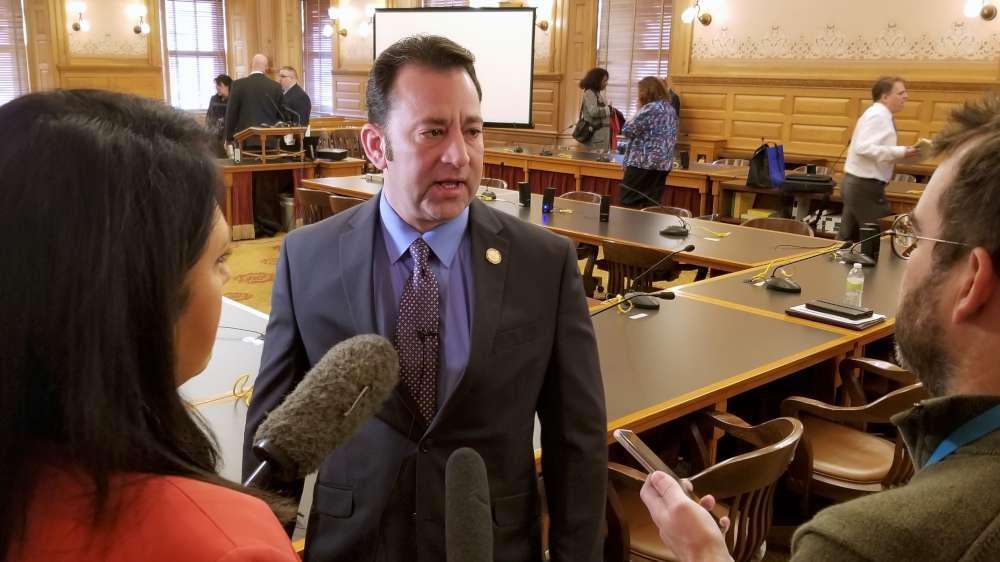
BY STEPHEN KORANDA
Kansas News Service
TOPEKA — Kansas Governor Laura Kelly’s budget wish list is long: boosting spending on higher education, public safety and human services. She'd aim to cut some taxes, but look to add new ones for streaming video and music services.
Not surprisingly, the $7.8 billion plan is getting a mixed response from the Republicans who control the Legislature.
It’s the Democrat’s second budget proposal since taking office, and she’s relying less on some maneuvers used in past years, like taking money from the state highway fund to help keep the budget in the black. But she still wants some flexibility in state spending, so she’s hoping to refinance the state’s $9 billion in pension debt.
“Kansas has made tremendous strides in recovering from the last decade of fiscal chaos,” Kelly said in a statement. “This balanced budget builds on that progress and positions Kansas to begin a new decade of shared prosperity and growth.”
By the time this budget’s fiscal year (July 2020 to June 2021) ends, the state would still have about $628 million in reserves. That’s less than $1.1 billion at the end of the 2019 fiscal year, but well above the tiny reserves a few years ago.
Kansas has been on a tax rollercoaster over the last decade — with the state cutting taxes starting in 2012 during the tenure of then-Gov. Sam Brownback. Lawmakers changed course in 2017 after struggles balancing the budget and reversed many of those tax cuts.

Kelly has a few ideas about taxes, and one of them is puting $54 million toward a program that helps reduce local property taxes. It hasn’t been funded since 2003.
Republican Rep. Troy Waymaster is skeptical, and said that for a $150,000 home, the discount would be about $25.
“Are people going to notice that? I would say probably not,” Waymaster said, suggesting that reducing vehicle taxes could have a bigger impact on Kansans’ lives.
The pension dilemma
It’s the second time Kelly has proposed reamortizing the Kansas Public Employees Retirement system’s debt.
The state has about 15 years left under a current plan to eliminate the deficit. Under that plan, KPERS payments will balloon to around $1 billion annually by 2032.
Kelly wants to add an extra 10 years, which she said would lower annual payments by $130 million to $160 million over the next four years. The payments would still top $1 billion, but not until 2041. And total costs to pay off the debt would rise by about $4.4 billion.
Lawmakers rejected reamortizing last year. Some Republicans still want to try to pay off the debt on the current schedule.
“I think that we need to remain frugal and we need to continue to pay our bills as best we can with what we have right now,” said Republican Sen. Carolyn McGinn, who chairs the Senate’s budget committee.

Kelly’s budget director, Larry Campbell, said the current 15-year payoff schedule will only come to pass if the state is on time, every time.
“That ain’t going to happen,” Campbell said Thursday at a meeting with lawmakers. “That assumes the payments are made perfectly from now on and they’ve never been.”
Reducing the annual KPERS payment will give the state the ability to invest in services like education and roads, he said, while keeping a financial cushion to help weather any economic downturns.
New streaming revenue and other ideas
To drive up revenues, Kelly is proposing adding sales taxes to more online digital purchases: Think Spotify, Netflix, Hulu or a digital download of magazines or books. Doing so could raise $22 million for the state's general fund, plus more for highways and local governments.
Campbell said buying a physical book, movie or audio recording in a Kansas-based store would be subject to sales tax, but those things purchased online in digital form currently avoid the fees.
“Kansas sales tax policy is antiquated,” Campbell said. “As more and more items are being purchased online, the least we can do is level the playing field for our existing Kansas businesses.”
When it comes to spending, the proposed budget would put millions more on state mental facilities, children’s services and corrections. The plan would renovate prison facilities in Winfield and Lansing to create dedicated substance-abuse treatment centers.
Kansas would also boost higher education spending by $28 million, with some targeted at need-based aid and technical education. Universities had requested more, including $50 million in base funding and $10 million for aid.
Kelly’s proposal also reduces, but doesn’t fully eliminate, shifting money from the highway fund to help balance the budget. The plan would divert almost $160 million away from roads — $73 million less than used last year. In 2018, Campbell’s office says the state “swept” (or shifted) $288 million.
Then, there’s more about taxes. Kelly wants to reinstate a refundable credit for food sales taxes for lower-income Kansans only. Costing the state $53 million, the annual tax credits range from $60 for an individual making under $30,000 to $240 for a married couple making under $40,000.
Campbell estimates 69,000 people get the state’s current nonrefundable tax credit and a total of 540,000 could receive a credit under the governor’s plan. It typically would be applied when Kansans file their taxes, but Campbell said there’s also a form to claim it without filing taxes.
Having people pay the sales tax and then apply for the credit was a concern for Republican Rep. Stephen Owens, who said they “may not end up getting anything back.”
Stephen Koranda is the Statehouse reporter for Kansas Public Radio and the Kansas News Service. You can follow him on Twitter @kprkoranda.





